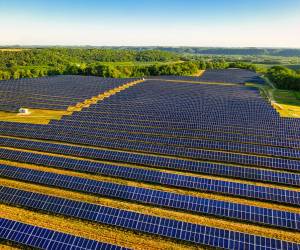In the face of environmental challenges, the shift towards renewable energy sources has become increasingly important. Solar energy, in particular, offers numerous environmental benefits and advantages. This article explores how going green with solar energy can have a positive impact on our environment, mitigating climate change, reducing pollution, and promoting sustainability.

- Mitigating Climate Change: Solar energy is a clean and renewable energy source that produces electricity without releasing harmful greenhouse gases. By replacing fossil fuel-based power generation with solar power, we can significantly reduce carbon dioxide and other greenhouse gas emissions, mitigating climate change and its detrimental effects on the planet.
- Reducing Air Pollution: Traditional energy sources, such as coal and natural gas, release pollutants and particulate matter when burned for electricity production. Solar energy, on the other hand, generates electricity without any emissions or pollutants. By adopting solar power, we can reduce air pollution, improving air quality and safeguarding public health.
- Conserving Water Resources: Conventional power generation methods, such as coal and nuclear power plants, require significant amounts of water for cooling purposes. Solar energy, being a water-free electricity generation method, eliminates the need for water consumption in the energy production process. By transitioning to solar power, we can conserve precious water resources, especially in water-scarce regions.
- Preserving Ecosystems and Biodiversity: Extracting and burning fossil fuels for energy production often leads to habitat destruction, ecosystem disruption, and the loss of biodiversity. Solar energy systems, on the other hand, have a minimal impact on natural habitats and ecosystems. By embracing solar power, we can help protect fragile ecosystems and preserve biodiversity.
- Sustainable Resource Use: Solar energy relies on an abundant and inexhaustible resource: sunlight. Unlike fossil fuels, which are finite and non-renewable, solar energy harnesses the power of the sun, which is available in vast quantities globally. By utilizing this sustainable resource, we can reduce our dependence on finite fossil fuel reserves and promote a more sustainable energy future.
- Noise Reduction: Traditional power generation methods, such as fossil fuel power plants or wind turbines, can generate noise pollution. Solar energy systems, however, operate silently, as they convert sunlight directly into electricity without any moving parts. This advantage makes solar energy particularly suitable for urban areas and residential settings.
- Community Empowerment and Resilience: Solar energy offers the potential for decentralized power generation, allowing communities to become more self-reliant and resilient. By installing solar panels on rooftops or implementing community solar projects, individuals and communities can generate their own clean energy, reducing dependence on centralized power grids and improving energy security.
- Longevity and Sustainability: Solar panels have a long lifespan, typically ranging from 25 to 30 years or more. This longevity contributes to the sustainability of solar energy systems, ensuring long-term energy generation with minimal maintenance requirements. Additionally, solar panels are recyclable, further reducing their environmental impact and promoting a circular economy.
Choosing solar energy as a green alternative to traditional power sources brings numerous environmental benefits and advantages. By reducing greenhouse gas emissions, minimizing air pollution, conserving water resources, preserving ecosystems, and promoting sustainable resource use, solar energy plays a vital role in mitigating climate change and protecting the environment for future generations. Embracing solar power is a crucial step towards a cleaner, greener, and more sustainable future.